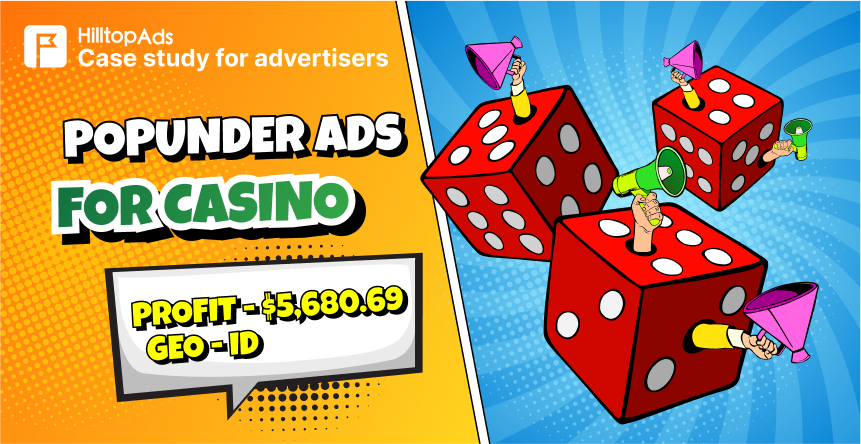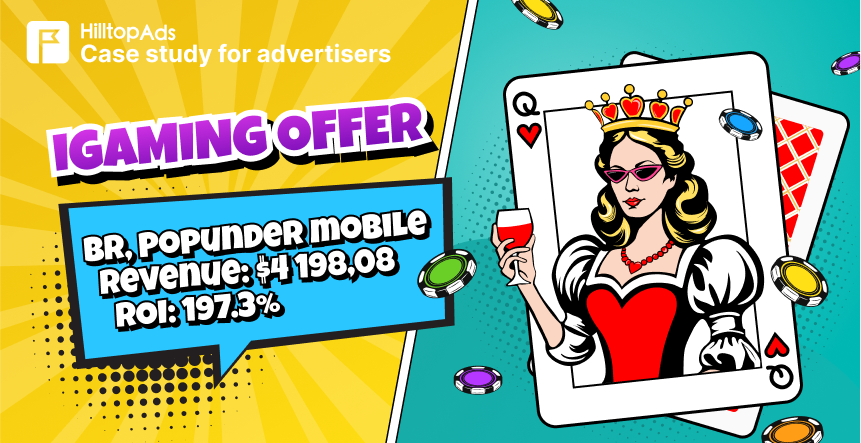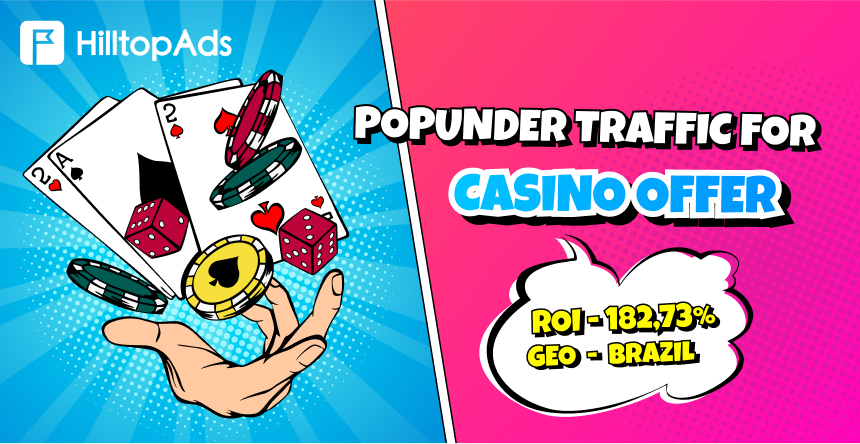This evergreen vertical will bring over $270 billion to advertisers worldwide by the end of 2025. This amount will only grow every year, so we have compiled a complete guide about iGaming, told you about the formats, the history of development and the legal side of this industry.
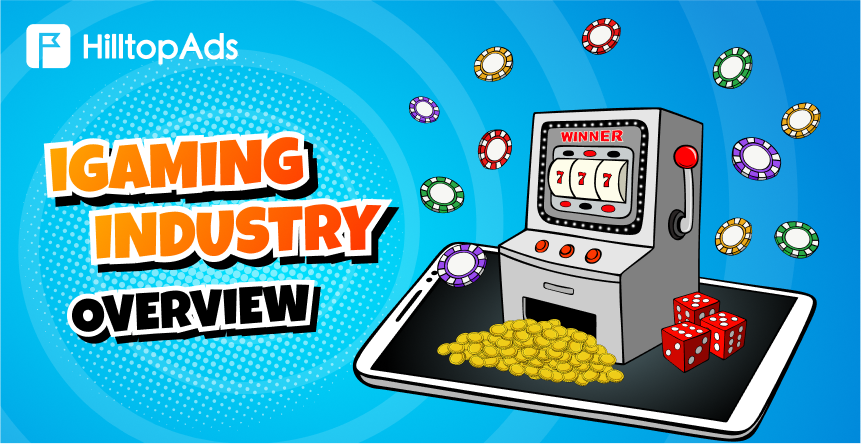
What Is the iGaming Industry?
Let’s hear what our invited expert from 3SNET, an affiliate network, has to say about iGaming.
Globally, iGaming is an ecosystem where, like LEGO bricks, you can build your own casino out of payment systems, licences, slots, games, odds feeds, tracking platforms, and other necessary modules.
iGaming is a broad term, encompassing online gambling and sports betting. In fact, it’s a bit broader than just gambling or classical betting, because iGaming includes more than just games of chance, featuring poker, blackjack, and betting on eSports, for example.
At the same time, iGaming involves only online activities, so traditional gambling made in brick-and-mortar casinos is outside the scope of this vertical.
Additionally, iGaming includes some exotic niches, like crash games, social casinos, and eSports. As a rule of thumb, everything involving the user placing a bet (not to be confused with bid 😊) is likely to be related to iGaming.
What exactly does iGaming include?
When we launched 3SNET, iGaming boiled down to four pillars: sports betting from offshore operators, script-based online casinos, lotteries, and home poker rooms. Then lotteries, bingo, and the first esports bets caught up. The next wave was crypto-casinos; legalisation appeared in several countries, and now social-casino offers come to us regularly.
We still haven’t seen decent fantasy-sports offers, while crypto-casinos keep evolving to accept fiat-currencies (government issued and not backed by precious metals, e.g., printed money) inside built-in exchangers.
For the last three years, we have observed the explosive growth of crash and instant games, as well as more and more countries introducing regulations for iGaming participants.
We are giving you a 5% discount from 3SNET on a one-time payment of $1,000 for new customers using the promo code HILLTOPADS_3S.

All direct iGaming advertisers will get $2,000 bonus for their first deposit!
Contact your personal manager, and they will give you a promo code for your first deposit of at least $5,000.
History of the iGaming Industry’s Growth
About thirty years ago, placing a bet required visiting a casino, racetrack, or poker room. Things began to change in the 1990s, when the iGaming industry kicked off with the innovative solution – telephone betting. Enabling bettors to guess the outcome of the match from home, bookmakers practically reinvented one of the most popular entertainment industries that ever existed.
Online betting and gambling were a bit shady, as casinos or bookmakers couldn’t see the person and secure the payment. The development of Real-Time Gaming (RTG) and Cryptologic software secured payment systems, allowing companies to process large volumes of transactions. This increased security and trust in online gambling, attracting a growing number of players.
To attract new players, online casinos started diversifying their game selection. With the commodities of the online space, they were able to include slot machines, video poker, and other table games for multiple players, like a casino but at the convenience of home. Moreover, they began offering welcome bonuses, free spins, and loyalty programs, which have become a signature of iGaming.
In the mid-2000s, smartphones started to gain traction, making iGaming accessible from anywhere. And then, things were topped off with live dealer games. Basically, people could stay at home and interact with the casino dealers as if they were in one room.
Right now, AI and machine learning permeates iGaming, shaping a new trend. Such technologies improve the gaming experience, enhances security, and creates a personalized environment for users. Let’s not forget about AR and VR, making live interactions online even more authentic.
But the most important part is that the trill of gambling has always been present. That’s why no matter whether users play cards or crash games, high rollers are always there, waiting for your winning approach to invite them into the game.
What Are the Types of iGaming?
iGaming is a broad vertical, and there are many niches within. We won’t name them all, but stop at the most popular ones among affiliates, so you know better what kind of offers to search for when needed.
At HilltopAds, any types of iGaming offers will get the highest number of conversions! Check out the case study from the HilltopAds advertiser:
Online Casinos
Online casinos are the trademark of iGaming. People can play blackjack, roulette, baccarat, roll the dice, and spin the wheel from home or while walking in the park. Modern technologies let the people feel the dim atmosphere of casino halls and get their blood pumping while the roulette spins.
Let’s not forget about live dealer games, where people get to interact with real croupiers online. All hail to the modern technologies bringing live interactions straight to our doorstep!
Sweepstakes Casinos
Sweepstakes can be considered as a separate vertical, but its underlying logic is very similar to gambling. Fortunately, the legislation treats Sweepstake casinos as a separate entity, so there are fewer legal challenges when it comes to promotion.
Sweepstakes casinos closely resemble traditional online casinos in terms of the game types and variety they offer. However, unlike regular platforms, these sites allow users to enjoy casino-style games without wagering real money.
Because of their unique structure, sweepstakes casinos aren’t classified as gambling – even though players can still win real cash and prizes by redeeming virtual tokens for rewards. This legal distinction allows them to operate in many regions where conventional online casinos are restricted or prohibited.
Social Casinos
Social casinos are one-way casinos in terms of deposits: there is no way to cash out. Usually, users can get free chips daily, but that takes too much time and ma them opt for donations and tons of chips immediately.
They can play games as usual, but never redeem their chips. The reason why it’s called “social” is because such casinos favor social interactions between members, like featuring a leaderboard, live chat with other players, mini-tournaments, and various social activities.
From the perspective of marketers, this type of casino is a good pick for RevShare (Revenue Sharing), because it’s never negative (users can only donate, not withdraw). However, getting these donations can be harder because… well… let’s be real here, many people gamble to win money, and if there is no way to cash out – why bother? Well, the answer lies in social interactions, having a good time, and feeling the casino vibe for free.
The main advantage of such casinos is that they ensure compliance even in the most challenging GEOs, Social casinos are not gambling in the traditional sense, so regulators usually treat it as some sort of entertainment. That’s why Pachinko (a local game, mixing pinball and casino elements) in Japan is still legal, unlike other gambling activities.
Online Sports Betting
Betting on sports events has always been a favorite way for fans to make money from their passion and foreknowledge. In the USA alone, 22% of the population have an account with at least one sportsbook, so the niche is thriving.
Bookmaking is an attempt to predict the outcome of certain events in a game, and you can try to predict almost anything: final score, total, handicap, and special events.
eSports Betting
If users can bet on football or racing, why can’t they bet on online tournaments? Computer games have become sports of their own, and people actively bet on their favorite teams and players there now. They can also bet on various outcomes, similar to traditional betting.
In general, eSports betting is the same as sports betting, with the only difference being in the means of putting one’s money on the line. Users can bet on team wins, single-player results, or tournament outcomes – the options for betting fans are almost unlimited. Moreover, some platforms allow players to bet with CS2, Dota2, LoL skins – virtual cosmetics for weapons, characters, etc.
Online Lotteries
Before the Internet became a part of our daily lives, many games like lotteries, keno, bingo, and mahjong were very limited in popularity and out of mainstream focus. But just like casinos, sports betting, and card games, they also became part of a digital world.
And while the lottery market value is smaller than most iGaming niches, it is growing fast. Even though cards, slots, and roulette are clearly more popular, the users may have a bias towards all of them. Lotteries and other games on the list are rarely associated with gambling and can attract a unique audience that is difficult to target when promoting other iGaming products.
Other
The list of iGaming products can go on forever. Apart from other classic games such as dice games, bingo, blackjack, slots, baccarat, etc., new games and game modes appear every year. For example, cryptocurrency casinos are gaining more attention as this type of payment becomes more accessible.
In addition, there are “crash games”, when players bet on a multiplying curve. The longer a player stays active, the more they can win, and they are free to cash out at any time. If the game crashes before they have cashed out, they lose. It’s a mixture of gambling and gaming.
One of the most popular examples is Aviator, a game that started this trend. Nowadays, there are lots of variations of “crash games.” Chicken Road and Plinko are also great examples. These have different gameplay, but just like any crash game, the victory is calculated by RNG (random number generator).

Sign up for HIlltopAds and try out the gaming types
to see which one will work best for you.
Top-3 Best Ad Formats for iGaming Industry
iGaming is all about emotions and adrenaline. That’s why either simple or highly visual ad formats tend to outperform the others. At HilltopAds, we detect exceptionally high performance for push ads, popunders, and video ads.
Popunder Ads
Popunders are the stable of iGaming among ad formats. They are hard to miss, but at the same time reside behind the main window until the user’s willing to open them up. Their effectiveness lies in high conversion rates, particularly for direct actions like registrations and deposits.

The main advantage of popunders is their huge window where you can fit in a spin-the-wheel game, some reviews, a whole video, and more. Just make sure not to go overboard and keep everything slim and on point.
Push Notifications
Push notifications have emerged as a powerful tool for both acquisition and retention in the iGaming space. By delivering instant, clickable messages directly to users’ devices, they achieve impressive click-through rates, especially when personalized with time-sensitive offers or exclusive bonuses.
The main advantage here is quickness. Push notifications are hard to ignore, yet they are small enough not to be irritating.
Video Ads
Video ads are the most engaging ad formats among them all, typically lasting 6–40 seconds (depending on their subtype). Whether through in-stream pre-roll ads, sliders, or interactive rewarded videos, they effectively showcase game previews, promotional offers, and brand messaging.
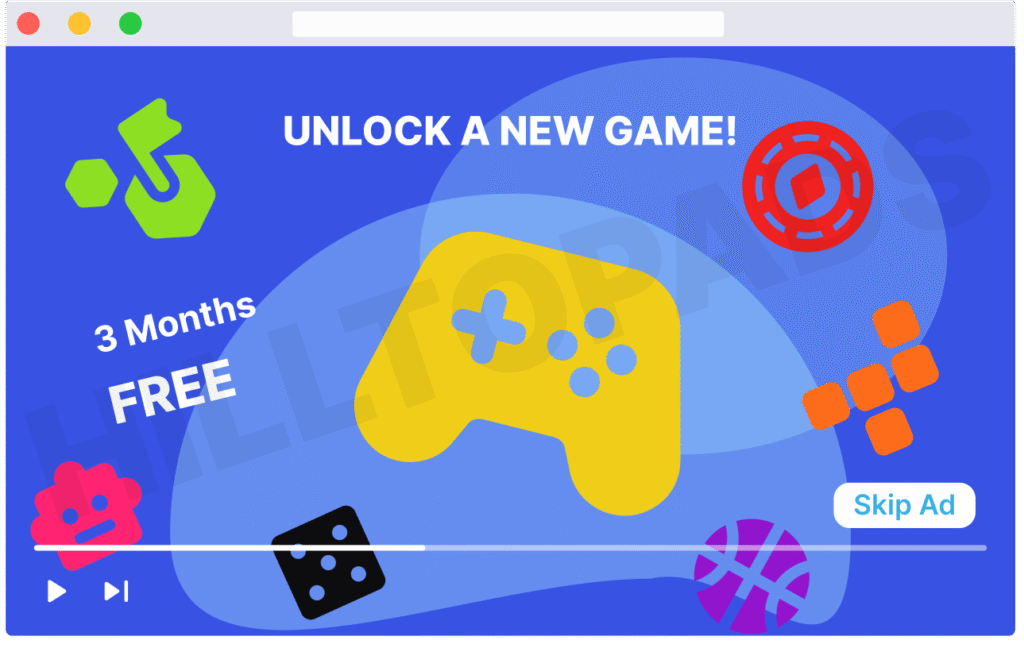
Video ads are dynamic and captivate the users immediately, but you basically have only 3 seconds to hook them before they’re gone. Use video ads to build trust and make the users recall what you offer in particular.
When executed through an ad network like HilltopAds, In-Page push, popunder, video, and other ad formats deliver exceptional results. Use our ad formats and traffic sources to optimize ROI, build a brand, improve retention, and achieve any marketing task you have at hand. Join now to ease your entry into iGaming with a team of professionals by your side.
What are the best approaches for iGaming regarding different ad formats?
There is no single best or worst approach. We see thousands of affiliates daily with different sources and combos and know everything has to be tested.
Yes, everyone now tries to drive traffic to slots or event-based landers, but old-school email still converts well. Many advertisers are wary of click-under/pop-under traffic, yet in our experience it is one of the most profitable sources. Often advertisers themselves block experimentation by insisting on the classic brief: “Give me FB (Facebook) and PPC (Pay Per Click, a.k.a., paid traffic).”
In our view, the best approach for an advertiser is to allocate a budget for testing various sources and understanding how they work so that they can build the next stages of the funnel on their side.
Traffic Sources for iGaming in 2025
High rollers can be found everywhere online. They frequent social media platforms, search stuff online, and listen to influencers. That’s why you have lots of targeting options: social media, ad networks, Telegram, and influencer partnerships.
Social Media Platforms
Social media platforms, particularly Meta (Facebook, Instagram), TikTok, and X (Twitter), remain crucial for iGaming marketing. These networks allow precise audience targeting through paid ads, organic content, and community engagement. AI ad optimizations and interactive formats (live streams and gamified promotions) are becoming more popular and effective.
However, you might need a pre-lander to work on Social Media Platforms, because their moderators usually don’t like gambling ads. Alternatively, you can go for PWA (Progressive Web Application), made with the help of special constructors found online, like Doxa.Apps, ZM Apps, and pwa.bot.
Ad Networks
Right, if you don’t want to do things manually, partner with an ad network. We give you all the tools, resources, and expertise so you can profit faster and on a bigger scale.
Ad networks excel in performance-based marketing, offering real-time analytics, fraud prevention, and GEO-targeted campaigns. As privacy regulations tighten, ad networks with first-party data and compliant tracking will become indispensable for iGaming affiliates.

If you are looking for a reliable and effective ad network, think no more,
HilltopAds has all the tools needed for successful promotion.
Telegram
Telegram is a popular traffic channel, where things look as they used to during the golden age of the internet. Quick and convenient access to essential features, genuine interactions, and increased security are all trump cards in the Telegram’s sleeve.
Mini-apps, casino bots, and various channels allow affiliates to engage users directly, offering instant gameplay and promotions. Telegram’s encrypted messaging and viral sharing features make it ideal for markets with strict gambling ad restrictions.
Telegram is also a great intermediary when you want either to warm up the users first or redirect them to avoid problems with moderation of social platforms. In general, you can combine several methods of generating traffic in one to create a complex funnel for better efficiency and retention.
Influencer marketing
People like to listen to charismatic experts who can explain complicated things with simple words. That’s why influence marketing continues to play a pivotal role, especially in regions where traditional ads are restricted.
Streamers, affiliate reviewers, and niche experts help build trust and drive conversions. Collaborations with influencers can work best if the person has a loyal and active audience. Special offers from streamers, for example, can drive traffic even better.
Overall, people enjoy watching live emotions, and influencers deliver just that. Moreover, if they can accurately predict the outcome of the majority of the games, people are likely to bet too. This, in turn, can be beneficial if you work on the RevShare basis.
What are the best traffic sources for iGaming offers?
The best channel depends on the task and product stage – from a noisy launch to steady scaling. Nothing beats classic media for brand awareness; offline hasn’t gone away. Media presence greatly affects onsite conversion.
Yes, yes – this is said by us, online people.
It is very hard to gain traffic and ROI quickly with online alone. Thousands of projects bring offers every year, and almost as many don’t survive twelve months because they lack budgets for promotion and media exposure.
Key Players in the iGaming Industry
Like in any game, you need to know not only the rules, but players as well. iGaming is no exception. There are several key players, whose roles you need to understand.
iGaming Supplier
iGaming suppliers (a.k.a. vendors) provide the technological foundation for online casinos and betting platforms. These companies develop platforms (like SoftSwiss or Playtech), payment processing systems, and compliance tools that ensure smooth operations. Without reliable vendors, iGaming websites couldn’t manage player accounts, payments, or regulatory requirements efficiently.
Game Providers
Game providers create the actual casino games – slots, poker, roulette, and everything that attracts players. Companies like NetEnt, Microgaming, and BGaming design high-quality, engaging games with innovative features. Their role is critical because content variety and quality directly impact player retention. A casino without strong game providers would struggle to compete in today’s market.
Players
Players are the industry’s lifeblood. Their demand for entertainment drives innovation and revenue. Suppliers, providers, affiliates, and webmasters constantly adapt to player preferences, such as the shift toward mobile gaming, live casinos, and cryptocurrency payments. Without a steady flow of engaged players, the entire iGaming economy would collapse.
Affiliates + Ad networks
Affiliates act as marketing partners, driving iGaming traffic to casino and betting sites in exchange for commissions. Affiliates are essential because they help operators scale acquisition efficiently, especially in competitive markets.
Ad networks ease the work of affiliates by granting quick access to great sources of traffic. Basically, ad network serves as a bridge between affiliates and players.
iGaming Industry – Is It Legal?
Regulations concerning online gambling, casinos, and iGaming can vary widely between countries and regions worldwide. While some areas have strict rules in place, others have chosen to open up their markets and embrace a more liberal approach.
The legality of the iGaming industry varies dramatically across jurisdictions, with some countries embracing regulation while others enforce strict bans. This patchwork of laws means operators must carefully study regional requirements to ensure compliance. The sector’s legal status hinges on local gambling laws, which can differ even within countries – like the U.S., where each state sets its own rules for online casinos and sports betting.
Operating without a license risks severe penalties, including fines, platform blocks, or criminal charges. Licensed operators gain legal protection, access to payment systems, and player trust. For example, Malta’s MGA and Curacao’s LOK licenses are sought after for their EU compatibility and credibility, while the U.S. requires state-specific permits.
As said earlier, it is necessary to check with the law updates, as they tend to change, once in a while. Here are some examples of shifts in laws around the world:
- Brazil lifted its 80-year gambling ban in 2023, legalizing online sports betting and casinos starting January 2025. Operators must now obtain licenses (costing ~30M BRL) and pay 12–18% GGR tax.
- Germany’s 2021 Interstate Treaty imposed strict deposit limits and banned slots features like autospin, pushing players to unlicensed sites. Conversely, Finland plans to end its state monopoly (Veikkaus) by 2028, opening the market to private operators.
- Ghana’s 10% tax on winnings (2024) backfired, driving users to offshore platforms; the government repealed it within months to salvage the legal market.
Although iGaming is a pretty lucrative niche, as you can see, it has some limitations. In order to avoid them, always monitor any changes in laws, regulations, tax changes, geoblocking, and advertising rules. Work with the credible suppliers and vendors to prevent legal lawsuits and other fines.
Profitability in different GEOs depends on the type of activity. Regulators definitely complicate life for affiliates, and for us, as a CPA network, it is more profitable to work in an unregulated market. But for other market players, regulated markets can become a growth zone – for example, for companies that provide turnkey licences.
In practice, today, an affiliate’s profit in a GEO is defined by three factors: traffic volume, quality of local products, and reliable payment solutions. Regulation is not always a plus or a minus. Where there are no rules, entry is easy, but the risk of scams and non-payments is higher (a typical example: some offshore parts of Latin America, a couple of years ago). Tough regulation raises the entry barrier and costs (Brazil after betting legalisation) but almost eliminates operator fraud and increases player trust.
Payment gateways can kill potential: in Argentina, conversion drops sharply because of restrictions on international payments, even though people are keen to gamble and products exist. A similar problem occurs in parts of Africa and Southeast Asia.
There is no single “fattest” market; a portfolio of several GEOs is safer: one gives volume, another margin, and a third stability. Top 3 for 3SNET right now are Brazil, South Africa, and Bangladesh.
Start working in iGaming industry with HilltopAds and you will get
- Advanced targeting options
- Direct traffic sources
- Self-serve platform
- Fully-managed service
- Postback tracking
iGaming Industry Trends
iGaming is a dynamic vertical, and it is evolving right now. Let’s see what trends are there as of 2025.
Blockchain Technology
Bloackchain is a popular topic these days, and major casinos do their best to implement it for the sake of fair gaming, instant transactions, and enhanced security.
Cryptocurrencies, like Bitcoin and Ethereum, enable payments from almost any part of the world, making them somewhat borderless. Also, let’s not forget about the so-called smart contracts, which enable transactions without intermediaries, provided the pre-conditions are met. Over 60% of online gamblers now prefer crypto casinos due to their transparency and anonymity.
Gamification
Gamification integrates game-like elements (leaderboards, missions, rewards) into iGaming platforms to enhance player loyalty. Features such as VIP tiers, achievement badges, and interactive challenges keep users engaged longer. This system is increasing retention by 15%.
Social Media Integration
Social media is becoming a core acquisition channel for iGaming industry. Platforms like Instagram, TikTok, and Telegram allow affiliates to run targeted ads, influencer collaborations, and community-driven challenges. Features like live-streamed casino games, shareable wins, and in-app sports betting enhance interactivity. Telegram’s mini-apps and bots also enable seamless gaming without leaving the chat, tapping into a younger, mobile-first audience.
Blockchain casinos, mass-market VR/AR, generative AI, and sudden regulatory moves are all the main “game-changers.” The biggest volatility is caused not by technology itself but by the mix of tech with new payout and tax rules. So, the key trend for 2025 is business flexibility for any tech + law combination rather than yet another shiny feature.
A negative trend: more and more scam projects appear – some on purpose, others by naivety – thinking iGaming means “a turnkey platform for $10-25K that will instantly bring players and money.” That’s how some market participants pitch it at conferences, but it’s an illusion.
How to Build a Successful Business in iGaming Industry
The iGaming industry is a highly competitive yet lucrative sector. To establish a thriving iGaming business, marketers must focus on legal compliance, unique value propositions, strategic marketing, and robust infrastructure.
Understanding Licensing Issues
Obtaining the appropriate license to operate a gambling business is the foundation of any iGaming venture. Different jurisdictions offer licenses with varying requirements and costs.
The choice of jurisdiction depends on factors such as the target audience, legal requirements, and budget. The right license ensures compliance with regulations and builds player trust.
If you’re an affiliate, then you need to work with reputable vendors, who are legally compliant and maintain their reputation without a reproach.
Choosing the Right Platform and iGaming Software
Technology is the backbone of any successful iGaming business. Partnering with a reliable platform provider can save time and resources while ensuring a seamless user experience. Key considerations include:
- Customization features: options for personalizing the brand and game offerings.
- Integration capabilities: support for various payment gateways and game providers.
- Security: advanced encryption systems to prevent fraud and ensure safety.
Top providers offer comprehensive solutions ranging from white-label platforms to fully managed services.
Building a Competitive Game Portfolio
A diverse game library is key to attracting and retaining players. Collaborate with top-tier game providers such as Ruby Play, Playtech, or Synot to offer popular titles, including slots, live dealer games, and sports betting options. Additionally, focus on content localization to customize your offerings to the preferences of your target market.
Promoting Your iGaming Business
Effective marketing can determine the success of your iGaming startup. Develop a solid marketing plan that includes:
- Search Engine Optimization (SEO): optimize your website for keywords to enhance visibility, and generate free traffic marked by its quality.
- Paid ads: a quick way to gain lots of traffic, a share of which can be turned into high-rollers.
- Social media campaigns: engage users on platforms like Instagram, Facebook, and TikTok.
- Retention Strategies: offer loyalty programs, bonuses, and personalized promotions.
Ensuring Compliance and Responsible Gaming
Adhering to regulatory standards and promoting responsible gaming are essential for long-term success. Implement policies to prevent underage gambling, provide self-exclusion tools, and offer support for players struggling with gambling issues.
We recommend that you read the successful cases of our advertisers to understand how this works in practice.
Final Thoughts
The iGaming industry offers immense potential for those willing to navigate its complexities. Success demands deep commitment, financial investment, time, and strategic thinking, but the rewards justify the effort.
From legal compliance and licensing to unique branding and multichannel marketing, every aspect requires meticulous planning. The right technology infrastructure, game selection, and payment solutions further determine long-term viability. While challenges like regulation changes and competition exist, operators who adapt thrive.
For entrepreneurs ready to invest wisely, iGaming delivers high profitability and scalability. The key is balancing innovation with compliance, ensuring sustainable growth in this fast-evolving sector.
As we’ve uncovered in this comprehensive look into iGaming, it is a massive industry with undeniable potential for success. However, to truly tap into the vast opportunities it provides, gaming businesses need to work with an experienced and capable partner, like HilltopAds. Sign up now, and our experts will help you take your first steps in this industry!



















